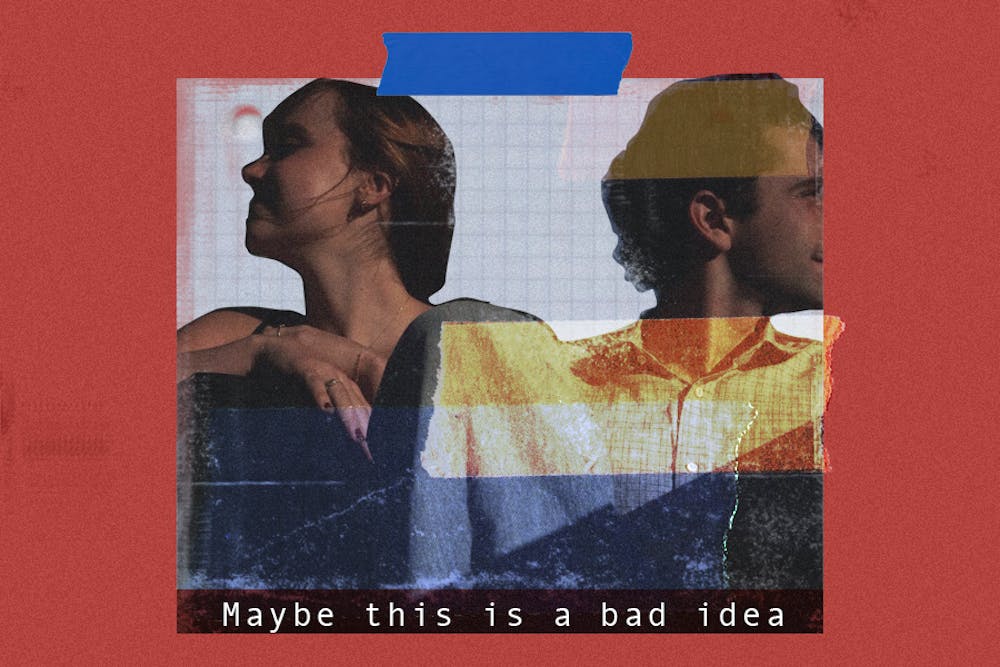From driving down dark, endless suburban California highways to exploring star–lit desert forests, songwriting duo Lila Dubois (C’ 25) and Miles Tobel are creating music that can’t be missed. In their premier album, Maybe This is a Bad Idea, the pair amplifies acoustic emotions into cinematic experiences. Through musical landscapes and gritty lyrics, their artistic relationship is one of sophisticated harmony.
In the first song written for the album, “Hold My Tongue,” Lila and Miles sing the heart–wrenching verses that would become the sapling for a complete record: “I can feel something’s wrong / Before it even comes / Can’t put my finger on / I'll hold my tongue.” Miles, who will be attending New York University in the fall, explains that the song came from a shared moment for the two artists, saying, “It’s about a relationship ending very slowly and how painful that is.” Lila admits, “We weren't planning on writing an album at all. We have this paper in Miles’ room that says August 15 of last year is when our EP is gonna come out, and then we got to that date and were like, ‘No, let’s just make a full album!’”
On the album’s final track—with an iPhone Voice Memos title “New Recording 512”—we hear the two of them sing the chorus to “Hold My Tongue,” and then Lila excitedly says, “It’s a start for sure. Okay, I’m excited.”
“About a year later,” Miles says, “I found it on my phone and thought, ‘We have to put this in there.’”
The album’s first track, “Hums” is an acapella mixing of harmonies that gradually bursts into a stunning and visceral composition. The song welcomes us into the atmosphere of the album, where even organic instruments have a dreamy undertone to their earthy texture. Guitar strumming becomes delicate and piano notes are water–like, so even guttural beats drop like smoke over the piece, like that in the song “Bones.”
When it comes to lyricism, the album travels from abstract to tangible memories. One of the first images in the album comes from the song “In the Throws:” “I’m tossed like a leaf in the rain / Like a kite on the chain / Like a swirl down the drain.” Lila describes it by saying, “I always go more esoteric and then Miles is always narrative, something you can grab onto, and then we whittle [it] down and find that happy medium.”
Lila describes their genre as, “Singer–songwriter if it were produced by a film scorer.” This touch to the album comes from Miles’ particular musical background. Miles says his aspirations in film scoring “informed a lot of the choices we made with the strings and cinematic sounds.” His production is where a song’s transformation occurs. “Our songs start with both of us at the piano or the guitar, writing in its purest form, and then we translate that. We breathe a new life into it when we sit down at the computer to produce it,” Miles says.
However, there are other influences inside their woodsy yet synthy record. “When I listen to the album, I can hear what songs we were really into at the time,” Lila says. “It’s very much rooted in folk, and then some more pop.” Their music feels like a Phoebe Bridgers track, but moves like a Billie Eilish song. For example, the soft, gothic wind production of “On One Hand” was directly inspired by Bridgers’ “Garden Song,” while the distinct transition of tone in “Never Been Better” echoes Eilish’s “Happier Than Ever.”
With lyrical poetry and a cinematic style, Lila explains the subconscious storyline within the album. “The individual songs go through an arc. [They are] many vignettes and little insights into our lives.” Although they may be embellished, Lila says, “I think on some level, you always put what you know.” When put up to a magnifying glass, references to other songs are hidden throughout the album, making it a single universe. For example, in “Never Been Better,” they sing, “Could’ve stopped you leaving / Held my tongue instead / Ghosts are in our hallway / Bones are in our bed.” Lila concludes, “Even if the story isn’t necessarily true, the feelings and opinions behind it are inevitably true to you.”
When writing the final song, Lila and Miles drove out to the spiritual and creative hideout Joshua Tree National Park—while listening to the U2 album by the same name, of course. Lila demanded that they would “camp and not come back until this is done.” Now, from jazzy piano ballads to mossy, medieval–like orchestrations, “Maybe This is a Bad Idea” is a “conglomeration of our creative spirits,” as Lila puts it. For the future of their work, there is no doubt that the two will continue to make relatable, yet surreal music that act as soundtracks for life.
All album profits go towards the National Network of Abortion Fund.







